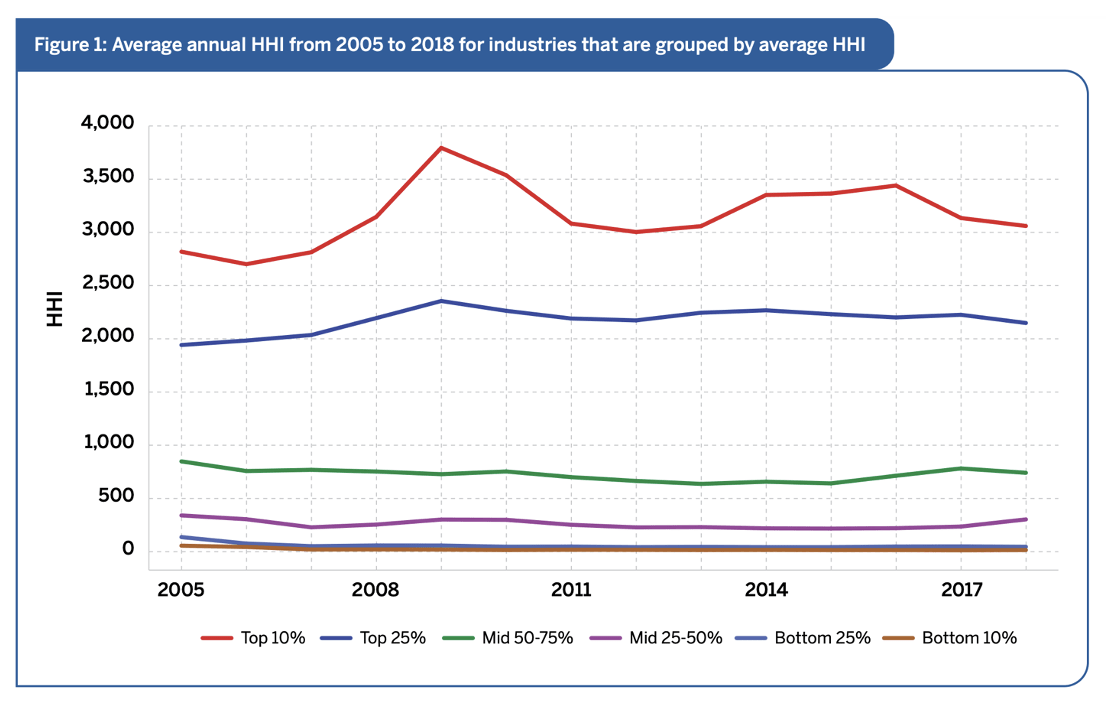Should Canadians be Concerned About Corporate Concentration Levels?
By Abdul-Hakim Fuseini
April 23, 2024
In recent times, the issue of corporate concentration has been making headlines, and rightly so. With big firms dominating the market, and taking up a larger share of the Canadian economy, it has become a source of worry for small businesses. This is not a ‘today’ problem; it has persisted for over 30 years and Canada cannot afford to remain silent on this issue.
In the past two decades, industries including manufacturing, automotive, retail, banking, air travel, telecommunications, etc. have seen increased levels of concentration. As a result, a few of corporations control a large portion of the Canadian market, giving them the ability to set pricing, restrict customer options, and suppress competition. Such unchecked dominance inevitably leads to negative consequences for consumers.
When corporate concentration exceeds levels conducive to efficient business operations, it tends to yield adverse social and economic consequences. When it reaches that point, businesses can take advantage of other businesses by controlling entry into markets and/or extracting excessive profitsvia monopolies.
Corporate concentration also commonly disadvantages suppliers, leading to reduced prices for their goods compared to what they would earn in a more competitive setting. Additionally, consumers face higher prices because sellers are able to charge more for their products in the absence of competition from other sellers. There is evidence suggesting that some inflation experienced today stems in part from tacit collaboration among firms operating in highly concentrated sectors. There is also research suggesting that increasing concentration can lead to a reduction in efficiency and innovation.

As outlined in a study by the Competition Bureau, (Figure 1), key indicators such as the Herfindahl-Hirschman Index (HHI), a widely accepted measure of market concentration, revealed concerning patterns of market concentration from 2005 to 2018. Specifically, the HHI within the top 10% and 25% most concentrated industries in Canada experienced more concentration during this period, indicating a consolidation of market power among a handful of firms.
Why competition is important
Global research continuously shows that competition fosters innovation and increases efficiency. Firms face competition from one another in a variety of ways. Certain businesses may opt to focus on selling a product of the best quality or developing a product that is at the forefront of technology, while others may choose to pursue a strategy of making things available for the lowest feasible price. This dynamic benefits consumers by reducing prices, expanding choice, and elevating quality; this effect is both quantifiable and significant, and it has been thoroughly researched.
Moreover, competition promotes efficiency by encouraging firms to constantly innovate and adapt to changing market conditions. A study by renowned economists Heather Boushey and Helen Knudsendemonstrates how competition acts as a catalyst for technological progress and organizational change, driving firms to invest in research and development and adopt new technologies to maintain their competitive edge. This process of “creative destruction”, as described by Economist Joseph Schumpeter, leads to innovation in industries and the emergence of new market leaders, ultimately benefiting consumers through lower prices, improved quality, and greater choice.
Consider the financial technology (fintech) sector in Canada, particularly the emergence of several fintech start-ups and digital banking platforms competing with traditional banks. For example, companies like Wealthsimple, a Canadian online investment service, have ‘disrupted’ the investment industry by offering low-cost automated investment management services (robo-advisors) accessible through user-friendly mobile apps. Wealthsimple’s innovative approach has challenged traditional investment firms and encouraged them to adopt digital strategies to remain competitive.
How can we fix the problem?
We can implement policies that grow our small business sector.
Incentivizing Collaboration: Small businesses are the backbone of Canada’s economy, contributing significantly to employment, innovation, and economic growth. To provide perspective, in 2021, small-scale enterprises comprised 98.1% of all employer businesses across Canada. Incentivizing collaboration means giving rewards or benefits to encourage different groups, such as small businesses, research institutions, and big companies, to work together on projects. This collaboration can help them share knowledge, transfer technology and come up with new ideas together.
A research article from the an article in the Journal of Business Economics and Managementemphasized the importance of collaboration in fostering innovation. One example is the partnership between the University of Waterloo’s Velocity program and various tech companies in the Waterloo Region, often referred to as Canada’s Silicon Valley. Through this collaboration, start-ups and established companies alike leverage the university’s resources and talent pool to develop innovative solutions and stay ahead of the competition in the rapidly evolving technology sector.
Embracing Digital Technologies: Digital marketing tools such as social media advertising, search engine optimization (SEO), and email marketing provide cost-effective ways for small businesses to target their audience with precision. As emphasized by Ryan Deiss, CEO of DigitalMarketer, “Content is king, but marketing is queen, and runs the household.” By crafting compelling digital marketing campaigns, small businesses can increase brand visibility and attract customers effectively. There is evidence that small businesses that invest in digital marketing witness a substantial increase in brand visibility and customer engagement.
Abdul-Hakim Fuseini is a graduate student in the Master of Public Policy program at McGill University’s Max Bell School of Public Policy. He previously taught and conducted research in finance, accounting and auditing at the University of Ghana Business School. Abdul-Hakim’s goal is to leverage his public policy education to collaborate across sectors and create impactful policies that support businesses and address societal challenges in Africa.
